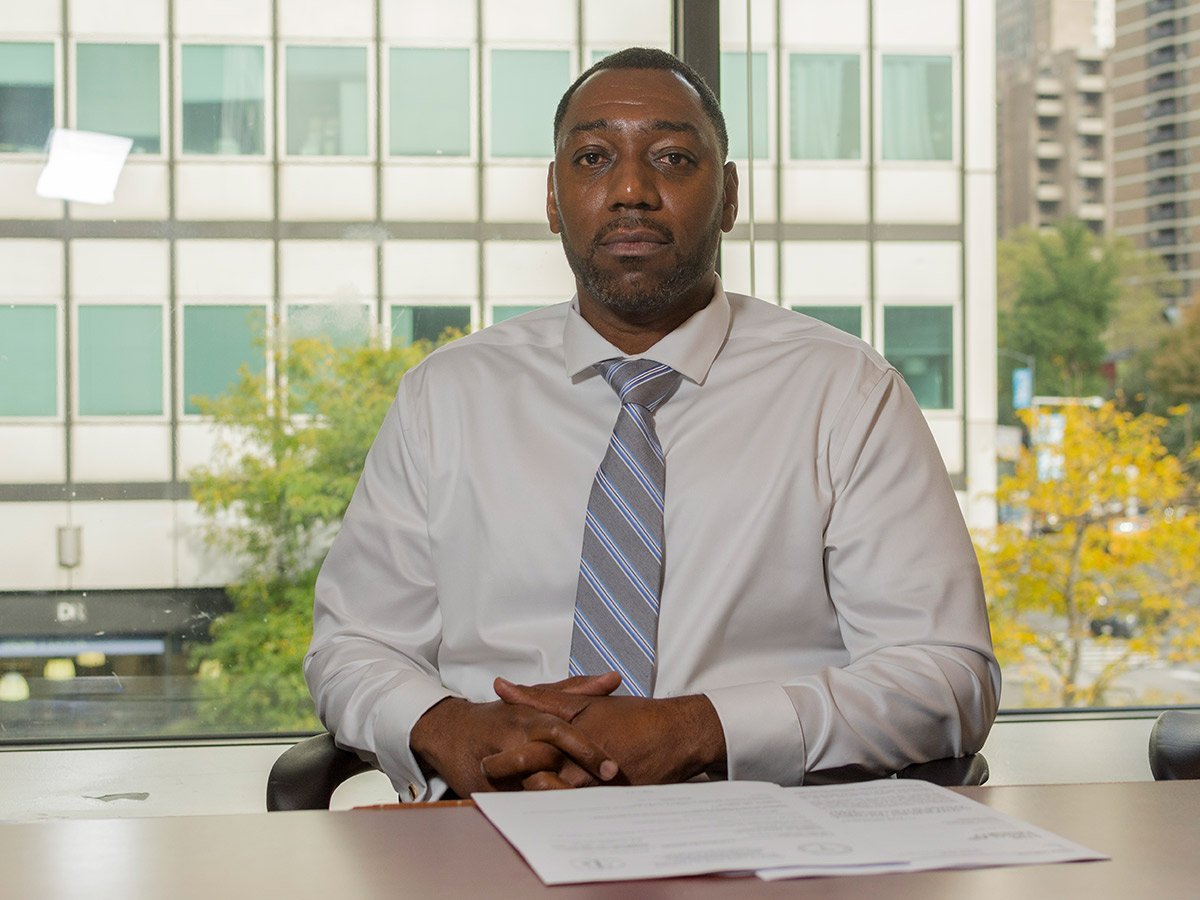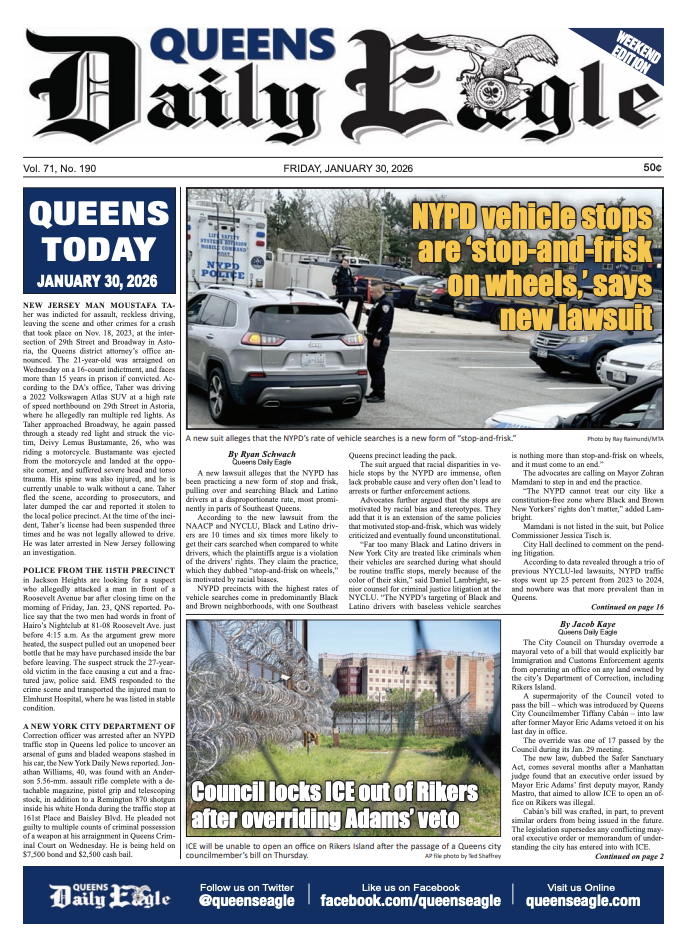Prosecutors knew witness to ‘93 Queens murder had bad vision – they’re retrying the man she ID’d anyway
/Michael Robinson is being retried for the murder of his estranged wife in 1993 after his original conviction was overturned last year. Now, his attorneys say newly discovered evidence should lead to a dismissal. File photo via the Legal Aid Society
By Jacob Kaye
In 1993, an 88-year-old woman took to the stand in Queens Criminal Court to tell the jury the story of how Michael Robinson, a then 26-year-old correctional officer, stabbed her home health aid to death.
Alveina Marchon said she was confident Robinson killed Gwendolyn Samuels, his estranged wife and Marchon’s caretaker, in a jealous rage. Samuels had recently become pregnant with her new boyfriend’s child, around a year after she and Robinson had separated.
During the trial, Marchon admitted that she’d had some difficulty with her vision – by the time of the trial, she was legally blind – but her eyesight was good enough at the time of the murder to identify the killer, she claimed. It was the same man who used to come to pick up her employee at the end of the work day and who once painted her house.
On Marchon’s testimony alone – there was no DNA evidence tying the defendant to the scene nor were there any other witnesses – Robinson was convicted of murder. He went on to spend the next quarter of a century in prison.
But more than three decades after Robinson’s conviction, Marchon’s reliability as a witness has been called into question.
New evidence shows that not only had doctors documented Marchon’s “long history of double vision” five months before the murder, but that her diagnosis had been given to Queens prosecutors before the trial and kept from the defense, Robinson’s current attorneys allege.
Marchon’s previously documented issues with her eyesight were never presented at trial, despite the fact that they allegedly contradicted the testimony she gave from the witness stand.
The documents detailing Marchon’s poor eyesight were recently uncovered as part of the Queens district attorney’s attempt to convict Robinson of murder – again.
Queens District Attorney Melinda Katz’s office is retrying a man wrongly convicted of a 1993 Bayside murder. New documents show prosecutors hid evidence that suggested the key witness had major vision impairments, the man’s attorneys allege. AP file photo by Mary Altaffer
Robinson, who is from Springfield Gardens, completed his sentence and was released from prison in 2019 and has long maintained his innocence in the case.
Last March, an appeals court overturned Robinson’s original conviction after newly discovered DNA evidence – which also wasn’t shared at the original trial – suggested that DNA material found beneath the victim’s fingernails was 78 trillion times more likely to match someone other than Robinson.
The panel of judges on the Appellate Division, Second Department bench said in their decision that the DNA evidence, which was discovered by Robinson himself during his decades-long effort to clear his name, would have likely changed the outcome of his 1993 trial had it been presented to the jury at the time.
After overturning the conviction, the appeals judges sent the case back to Queens’ trial court and gave the DA’s office several months to choose to retry Robinson or drop the case altogether.
Despite the appellate ruling, the DNA evidence and the completion of Robinson’s sentence, Queens District Attorney Melinda Katz’s office told a judge in September that they wanted to retry the case, 30 years after it first began in the courthouse on Queens Boulevard.
Much like their first case against Robinson, the DA’s new case is expected to rely entirely on the 1993 witness testimony given by Marchon, who is no longer alive – Robinson’s original defense centered around the claim that Marchon had mistaken Robinson for Samuels’ then-boyfriend, Jermaine Robinson, who shared a last name with Samuels’ former husband but who was not related to him.
With the renewal of Robinson’s prolonged legal saga came a new round of discovery, the formal name for the legal requirement prosecutors have to turn over the evidence they have against a defendant to their attorneys.
But unlike the mounds of evidence turned over by prosecutors in 1993, the evidence turned over to the Legal Aid Society this year contained documents written by a doctor concerning Marchon’s eyesight.
In a fax sent to then-Assistant District Attorney John Scarpa several days before the start of the trial, Dr. Michael L. Slavin said that Marchon had a “long history of double vision” at both far and near distances, “key points that Ms. Marchon (and ADA Scarpa in summation) denied at trial,” Robinson’s attorneys said in a May motion – Scarpa, who served as a prosecutor for decades before becoming a defense attorney, was convicted in 2019 of bribery after federal prosecutors say that he bribed a witness to commit perjury in a double homicide trial.
A doctor’s evaluation of Alveina Marchon’s eyesight five months before she witnessed a murder in her Bayside home. The evaluation, which was sent to Queens prosecutors ahead of the 1993 trial of Michael Robinson, was never shared with the defense. Document obtained by the Eagle
As a result of the alleged Brady violation – the legal term for when prosecutors violate a defendant’s constitutional rights to a fair trial by suppressing evidence that may be favorable to them – Robinson’s attorneys say that he was denied his right to a full and fair opportunity to cross-examine Marchon in 1993. They also allege he will again be denied that right at his upcoming trial.
Robinson’s attorneys called on Queens Supreme Court Justice Stephen Knopf to dismiss the case in May.
“Michael Robinson did not receive a full and fair opportunity to cross-examine the prosecution's star witness, Ms. Marchon, on crucial issues involving her eyesight and the materially false testimony she gave about it,” said Michelle Benoit, a staff Attorney with the Homicide Defense Task Force at The Legal Aid Society.
“This is all due to the prosecution's refusal and failure to produce critical evidence revealing Ms. Marchon's long history of imparted vision – which she and the DA's office denied at trial,” Benoit added. “As such, the court must dismiss the indictment against Mr. Robinson because of this egregious suppression of Brady evidence, a clear violation of the law.”
In response to the filing from the Legal Aid Society, prosecutors say that Robinson did indeed have an opportunity to question Marchon’s vision during the original trial – and that he took full advantage of that opportunity.
“During cross-examination, defense counsel asked Marchon repeatedly about her eyesight,” prosecutors said in their court filing. “He asked if she could see the back wall and if it was ‘blurry.’ She responded that it was ‘blurry.’ He asked if her eyesight had become worse, and she confirmed that it had. Counsel asked if her eyesight was ‘real good’ on the day of the murder, and she replied that it was.”
“Defendant thoroughly cross-examined Marchon about her eyesight at the first trial and had medical records with similar findings to the newly disclosed vision records,” they added.
Citing the ongoing litigation, the Queens DA’s office declined to comment on the case for this story.
Knopf, who has had several of his rulings in Robinson’s case overturned by the Appellate Division, is expected to rule on the defense’s request for dismissal in September.
Regardless of how Knopf – who is retiring at the end of the year – rules on the motion, Robinson’s attempt to clear his name will likely not yet be over.
Both Robinson and the Queens DA have appealed Knopf’s rulings to the Appellate Division several times – Katz’s office failed last year to get the Court of Appeals to overturn the Appellate Division’s reversal of Robinson’s conviction.
The Appellate Division has already shown that it has doubts about Marcon’s testimony, should Knopf deny Robinson’s motion to dismiss the case and should his attorneys appeal.
“The only identity evidence offered by the People at trial was the testimony of a single eyewitness, Marchon, who was 88 years old at the time of the incident and suffered from significantly impaired vision,” their March 2023 decision read.
In its ruling, the panel of appellate judges said that Marchon’s description to the police of the “perpetrator’s appearance was not conclusive and was, in part, more consistent with [the victim’s boyfriend at-the-time] Jermaine Robinson’s appearance.”
“Under the facts of the case, it would not have been unreasonable to conclude that Marchon confused Samuels’s estranged husband with her current boyfriend in making her identification to the police,” the judges said.
Katz herself has previously noted that cases that rely on only one witness – regardless of the quality of their vision – deserved extra scrutiny. As a candidate for district attorney in 2019, the then-borough president told the Eagle that such cases were the reason the Queens DA’s office needed a Conviction Integrity Unit, an office she created after winning her election.
Though she declined at the time to comment on Robinson’s case specifically, she said that her “first priority will be to review all the facts for cases that rely on a sole witness and make appropriate determinations based on the evidence.”






